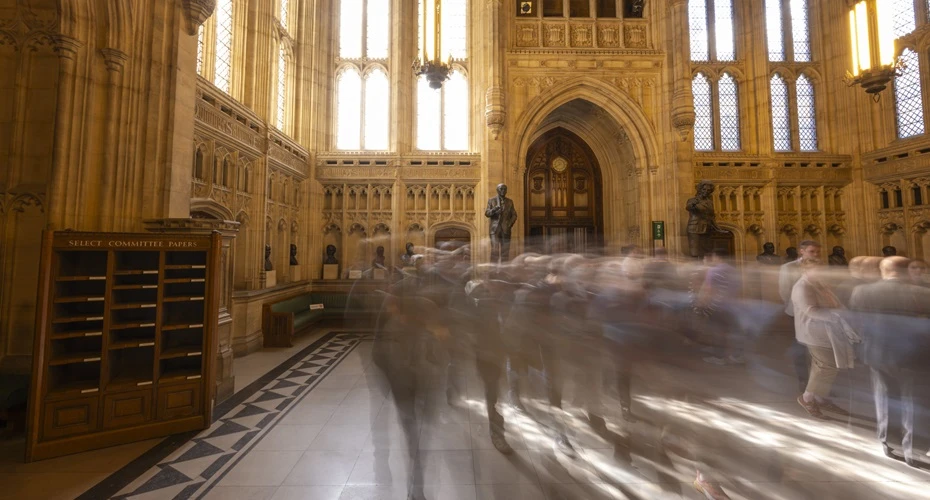Examining work environments for disabled Members of the House of Commons
Please feel free to contact Dr Ekaterina Kolpinskaya at e.kolpinskaya3@exeter.ac.uk if you have any questions or inquiries about this study.
Find out more
The importance of ensuring disabled people are included ad represented in British democracy has grown dramatically: almost one in four (24%) or 16 million people report being disabled. By contrast, only 8 MPs (or 1.2%) declared having a disability in the 2019-2024 Parliament, with the number increasing to 12 MPs (just under 2%) after the 2024 General Election.
Much of this discrepancy reflects persistent ableist stereotypes among voters and political parties. There is also a perception that the UK Parliament is ‘a symbol of glorious past’, out of touch with the changing society and its needs: its working environment is considered ‘hostile’ and inaccessible for disabled politicians, and can be particularly detrimental to their mental health.
Our research
Over the past two years, Dr Ekaterina Kolpinskaya has researched disability inclusion of and accessibility practices for Members of the House of Commons as a Parliamentary Office for Science and Technology (POST) Fellow hosted by the Centre of Excellence for Procedural Practice of the House of Commons.
Dr Kolpinskaya writes:
I have examined written rules and guidelines on accessibility, observed these practices in real life, and interviewed members of the House and MPs staff, as well as several Members and peers.
Increasing inclusion in the House of Commons
My research shows that there is an increasing sense that the House of Commons wants to be inclusive and accessible to disabled Members, which is supported by its institutional commitment to disability inclusion and well-developed, dedicated support services.
Development of unicameral and bicameral services, semi-formal workplace networks and a multi-agency approach to supporting disabled politicians, as well as improvements to accessibility in some parts of the parliamentary estate, are examples of good practice and a significant step forward for the institution. Likewise, technical solutions and aids provided by parliamentary services and the IPSA improve the daily lives and work of disabled Members significantly.
Challenges for disabled MPs
These successes are more modest, however, when it comes to adjusting procedural norms and practices that rely heavily on consensus, and which in turn require cross-party collaboration and a more collegiate and less adversarial culture of interactions between Members from opposite sides of the aisle. The House remains a busy place where partisanship trumps collegiality, and where building consensus takes much time and effort. Disability-related concerns – in addition to being complex and often misaligned with each other – are often outweighed by considerations of institutional efficiency and effectiveness, and trade-offs with required resources and associated costs, as well as competing sustainability and security considerations.
Given that the number of visibly disabled Members and Members who self-identify as disabled is small, the House mostly adapts existing systems on a case-by-case basis, on demand rather than designs a comprehensive system. This reinforces the need for individual Members to adapt to the ways of the House and results in a complex patchwork of remedial measures aiming to improve work environments for disabled MPs.
Read the full report
Dr Kolpinskaya's report highlights good practices relating to disability inclusion and accessibility that exist in the House of Commons and explores remaining challenges to be addressed. It also offers food for thought with regards to how these issues can be tackled in future.
Impact on the House of Commons
In June 2025, Dr Kolpinskaya gave evidence to the House of Commons Modernisation Committee on what barriers MPs with disabilities face; how the physical parliamentary estate could be made more accessible to those with disabilities; and whether changes to language, activity and procedure could make it easier to engage with Parliament. Watch a recording of the Committee meeting here.
Dr Kolpinskaya contributed written evidence on ‘Enhancing data collection and sharing practices and improving accessibility of procedures’ to the House of Commons Modernisation Committee inquiry on Access to the House of Commons and its Procedures and on ‘Call lists and disabled Members’ to the House of Commons Procedure Committee inquiry on Call Lists. They were referenced in the respective Committee reports on Access to the House of Commons and its Procedures published on 11 December 2025 (on p. 23) and on Call Lists published on 3 February 2026 (on p. 7).
